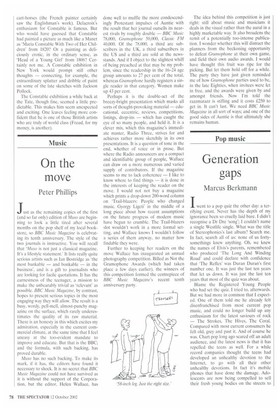Music
On the move
Peter Phillips
Just as the remaining copies of the first (and so far only) edition of Muso are beginning to look a little tired after several months on the pop shelf of my local bookstore, so BBC Music Magazine is celebrating its tenth anniversary. The style of the two journals is instructive. You will recall that `Muso is not just a classical magazine. It's a lifestyle statement.' It lists really quite serious artists such as Ian Bostridge as 'the most bankable — and bonkable — in the business', and is a gift to journalists who are looking for facile quotations. It has the earnestness of the teenager, a mission to make the unbearably trivial as 'relevant' as possible. BBC Music Magazine, by contrast, hopes to present serious topics in the most engaging way they will allow. The result is a busy, wordy, pell-mell, almost-punchy magazine on the surface, which rarely underestimates the quality of its raw material. There is an honesty in this which excites my admiration, especially in the current commercial climate, at the same time that I feel uneasy at the too-evident mandate to improve and educate. But that is the BBC; and the formula, with such backing, has proved durable.
Musa has no such backing. To make its mark, if it has, the editors have found it necessary to shock. It is no secret that BBC Music Magazine could not have survived as it is without the support of the Corporation, but the editor, Helen Wallace, has done well to muffle the more condescendingly Protestant impulses of Auntie with the result that her journal outsells its nearest rivals by roughly double — BBC Music 78,000, Gramophone 50,000, Classic FM 40,000. Of the 78,000, a third are subscribers in the UK, a third subscribers in the US and a third are sold at the newsstands. And if I object to the slightest whiff of being preached at that may be my problem, since the readership in the 16-24 age group amounts to 27 per cent of the total, whereas Gramophone hardly registers a single reader in that category. Women make up 43 per cent.
Perhaps it is the double-act of the breezy-bright presentation which masks all sorts of thought-provoking material — educational, eccentric, reviews, competitions, listings, drop-ins — which has caught the eye of so many people, and held it. It is a clever mix, which this magazine's immediate master, Radio Three, strives for and achieves rather more sketchily in its own presentations. It is a question of tone in the end, whether of 'voice or in prose. But where the Radio announcers are a compact and identifiable group of people, Wallace can draw on a more numerous and varied supply of contributors. If the magazine seems to me to lack coherence — I like to know where to find things — it is done in the interests of keeping the reader on the move. I would not not buy a magazine which prints a drop-down 200-word column on Trail-blazers: People who changed music. Gyorgy Ligeti' in the middle of a long piece about how recent assumptions on the future progress of modern music have begun to crumble. The Trail-blazers slot wouldn't work in a more formal setting, and Wallace knows I wouldn't follow a series of them anyway, no matter how findable they were.
Further to keeping her readers on the move Wallace has inaugurated an annual photography competition. Billed as Not the Gramophone Awards (which had taken place a few days earlier), the winners of this competition formed the centrepiece of BBC Music Magazine's recent tenth anniversary party.
The idea behind this competition is just right: still about music and musicians it deals in the visual rather than the aural in a highly marketable way. It also broadens the remit of a potentially too-intense publication. I wonder whether this will distract the planners from the beckoning opportunity to defeat Gramophone at their own game, and field their own audio awards. I would have thought this fruit was ripe for the picking. But let them hold off for a while. The party they have just given reminded me of how Gramophone parties used to be, in the late Eighties, when invitees were let in free, and the awards were given by and amongst friends. Now I'm told the razzmatazz is stifling and it costs £250 to get in. It can't last. We need BBC Music Magazine in all sort of ways; and one of the good sides of Auntie is that ultimately she remains human.


































































































 Previous page
Previous page